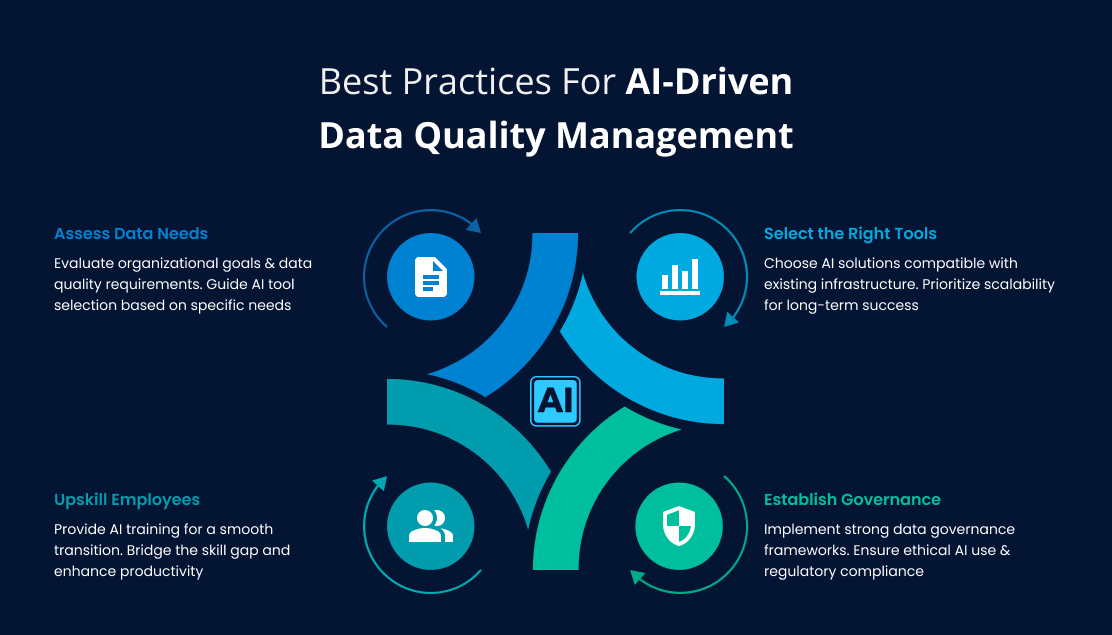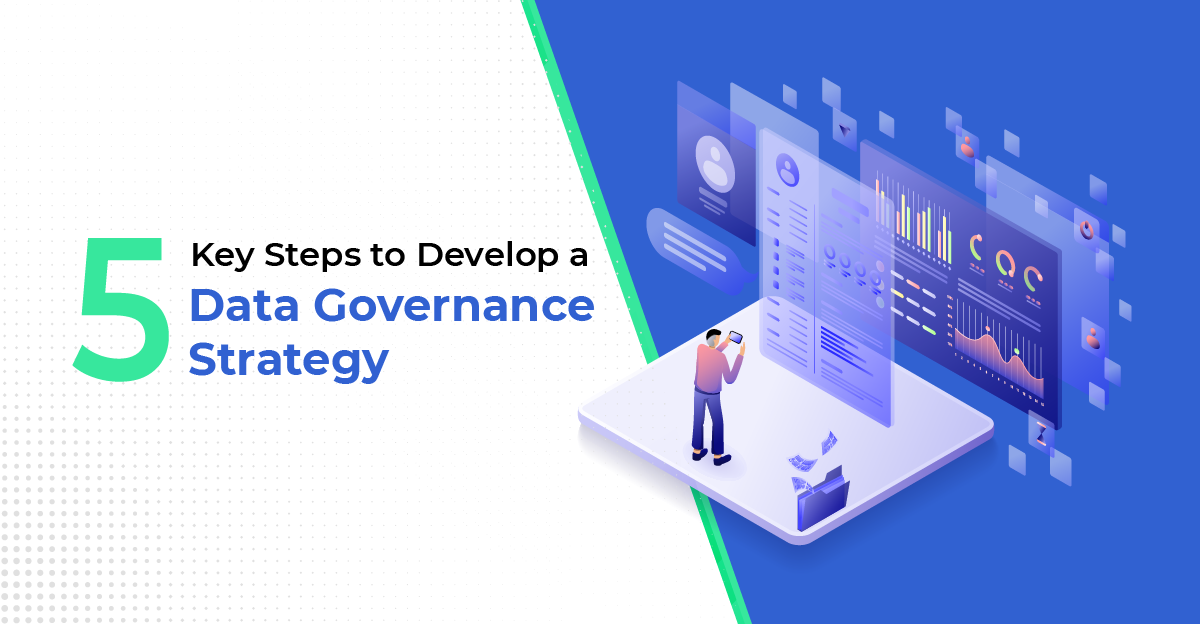In the digital battleground of 2025, data is not just an asset—it’s the ultimate weapon. The quality of business insights hinges on how well the data is organized, cleansed, and kept ready for action. With global data volumes expected to reach a staggering 181 zettabytes by 2025, organizations face the critical challenge of how to ensure data quality. With 95% of businesses recognizing data quality as critical to their digital transformation efforts, artificial intelligence (AI) is no longer an optional upgrade—it’s a mission-critical necessity.
In this deep-dive exploration, we’ll unravel how AI is reshaping data quality management (DQM), offering enterprises unprecedented insights, efficiency, and a competitive edge in the data-driven landscape of 2025 and beyond.
Key highlights we’ll explore:
- The economic impact of data quality challenges
- How AI is revolutionizing data governance
- Practical strategies for implementing AI-driven data management
- Real-world case studies of transformative data intelligence
Importance of data quality management in data-driven landscape
It is no coincidence that data professionals are investing heavily in data preparation and quality as poor data quality can derail strategic decisions, lead to compliance issues, and even hurt customer trust. According to reports, poor data quality is a $3.1 trillion annual drain on the US economy, with enterprises losing up to 20-30% of their revenue due to data-related inefficiencies. companies an average of $12.9 million every year. It can be a silent but significant business risk to rely on inaccurate or incomplete data.
Traditional data management approaches are rapidly becoming obsolete. The new paradigm demands intelligent, adaptive systems that can not only detect and cleanse data in real-time but also predict and prevent data quality issues before they emerge. AI’s ability to process massive datasets, detect patterns, and automate tasks is transforming data quality management and data governance. No wonder, that the AI-driven data management market is projected to hit $30.5 billion by 2026 as organizations turn to it for integrating AI data governance into enterprise data management strategy.
The Role of AI in Data Quality Management – Benefits of AI Automation
AI’s role in data governance and data quality management extends beyond operational efficiency. It drives better decision-making, fosters innovation, and strengthens compliance with ever-evolving data privacy regulations like GDPR and CCPA. It’s essential to understand the broader benefits AI offers to data quality management and governance.
Scalability: AI-driven solutions can handle vast data sets with ease, making them scalable for businesses that continue to grow in size and data complexity.
Increase in Efficiency: AI helps automate repetitive tasks such as data cleansing, validation, and profiling, freeing up valuable human resources and accelerating workflows.
Improvement in Accuracy: Human errors in manual data management can lead to significant costs. AI-driven data quality management ensures accuracy by automatically identifying and resolving inconsistencies in real time.
Cost Reduction: AI lowers the cost of managing and maintaining high-quality data by reducing human intervention and minimizing errors. According to McKinsey & Company, businesses using AI in quality control have seen at least a significant reduction in product defects and improved quality.
How AI Automation Transform Data Quality Management
Traditional methods of data quality management often fall short when handling the scale and complexity of modern data ecosystems. AI-powered solutions address these limitations by combining cutting-edge technology with operational efficiency. Ensuring high-quality data is a complex process involving cleansing, validation, monitoring, and analytics. Here’s how AI redefines these processes:
- Automated Data Cleansing, Standardization and Validation: AI algorithms identify and correct errors in data sets, ensuring consistency without manual intervention.
- Real-Time Data Monitoring and Quality Assurance: AI enables continuous tracking of data flows, immediately flagging anomalies or inconsistencies.
- Predictive Analytics: By analyzing historical trends, AI anticipates potential data quality issues, allowing proactive measures.
- Data Governance and Compliance: AI automation streamline compliance by automatically verifying adherence to data governance policies and regulations. Thus it provides clear audit trails, ensuring transparency and accountability in data management practices.
Challenges in Implementing AI for Data Quality
Implementing AI for data quality comes with its own set of challenges. Here are some key obstacles businesses face:
- Data Privacy and Security Concerns: With AI systems collecting and processing vast amounts of data, ensuring data privacy and security becomes paramount. According to a report by KPMG, 86% of the US general population say data privacy is a growing concern for them. Organizations must navigate complex regulations and safeguard sensitive information to maintain user trust.
- Integration Complexities with Existing Systems: Integrating AI solutions with legacy systems can be a daunting task. Only 11% of organizations have incorporated AI into multiple parts of their business, highlighting the challenges of scaling AI beyond pilot projects. Compatibility issues, outdated architectures, and data silos often hinder seamless integration, requiring a strategic approach to align AI with existing IT infrastructure.
- Requirement for Skilled Personnel: Effective AI implementation demands a team with specialized skills in data science, machine learning, and AI engineering. Only 20% of privacy professionals say they are totally confident in their organization’s privacy law compliance . The rapid evolution of AI technologies necessitates continuous learning and adaptation to keep up with advancements.
Powerful Success Stories in AI-Powered Data Quality
Industry leaders across the globe are setting remarkable benchmarks in AI – powered automation adoption. Their journeys offer invaluable insights into how artificial intelligence is reshaping traditional business models and driving unprecedented operational excellence.
For instance, Telstra, Australia’s leading telecommunications company, optimized customer service and network management using AI. By analyzing vast data, they predict network congestion and proactively manage resources, ensuring seamless connectivity and improved customer experiences.
Bunnings, a home improvement retailer, adopted AI for real-time product information. AI-powered robots and interactive maps streamline processes, reduce manual tasks, and enable staff to focus on customer service, enhancing the shopping experience.
In the financial sector, a major example of AI-powered automation driving success is that of The Bank of Queensland that uses AI to process millions of contracts for compliance. AI technology accelerates processing, reduces errors, and enhances compliance, demonstrating AI’s efficiency in handling unstructured data.
The above are just a few instances of success achieved by giants in thri AI implementation but these cases are rising. These success stories showcase AI’s transformative potential in improving data quality and driving business innovation. By overcoming challenges like data privacy, integration complexities, and the need for skilled personnel, organizations can achieve remarkable results with AI.
Best Practices for Adopting AI in Data Quality Management
Incorporating AI into data quality management is a game-changer for businesses aiming to stay ahead in an increasingly data-driven world. However, to truly harness the power of AI, it’s essential to follow best practices that ensure seamless integration and optimal performance.

- Assess data needs – Evaluate your organizational objectives and data quality goals. Understanding the specific requirements of your business will guide the selection of appropriate AI tools and strategies. A study by Gartner suggests that organizations that regularly assess their data needs are 3.5 times more likely to achieve their data quality goals.
- Select the right tools – Choosing AI solutions that align with your existing infrastructure is vital for successful implementation. Compatibility and scalability should be at the forefront of your decision-making process. According to McKinsey, companies that carefully select AI tools see a 20% increase in operational efficiency.
- Upskill employees – Investing in employee training ensures a smooth transition to AI-powered tools. Providing comprehensive training programs helps bridge the skill gap and empowers your team to leverage AI effectively. A report by PwC highlights that companies that invest in upskilling their workforce experience a 15% boost in productivity.
- Establish governance – Implementing strong data governance frameworks is essential to ensure ethical AI use and regulatory compliance. Clear policies and procedures help maintain data integrity and build trust with stakeholders. The International Data Corporation (IDC) notes that robust data governance can reduce compliance costs by up to 30%.
Future Trends and Outlook: The Evolving Role of AI in Data Quality
The role of AI in data quality management is set to grow exponentially, driven by several key factors. Rapid advancements in AI algorithms and tools are paving the way for enhanced data management. Improved accuracy, speed, and efficiency are just a few benefits of the latest AI technologies. The global AI in data quality market is projected to reach $6.6 billion by 2033, growing at a CAGR of 22.10%. This growth reflects the increasing reliance on AI to drive data quality initiatives and improve overall business performance.
Emerging Challenges
Despite its potential, AI adoption in DQM is not without challenges. Data privacy concerns, scalability issues, and integration complexities are some hurdles businesses must overcome. A study by Deloitte reveals that 62% of organizations cite data privacy as a major concern when implementing AI.
Conclusion
AI-powered automation is more than just a buzzword; it’s a transformative approach to ensuring data quality in the modern enterprise. By enhancing accuracy, driving cost efficiency, and simplifying data management, AI provides a significant competitive edge. As organizations continue to digitize, adopting AI in data quality management isn’t just an option—it’s a necessity.
Partner with Techment for Seamless AI Adoption
Techment is your trusted partner in navigating the complexities of AI adoption. With a proven track record of delivering innovative solutions, we offer tailored AI services that align with your business goals. From feasibility assessments to fine-tuning pre-trained models, we ensure your AI initiatives are secure, efficient, and impactful. Our expertise in integrating AI with existing systems and providing comprehensive training programs makes us the ideal partner for your AI journey. Let’s discuss how AI can drive your business forward. Get in touch with us today!
 All Posts
All Posts
